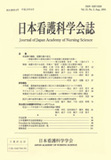Japanese
English
- 販売していません
- Abstract 文献概要
- 参考文献 Reference
- サイト内被引用 Cited by
要旨
本研究の目的は,妊娠末期から産後15週までの母親の睡眠・覚醒パターンの変化を初・経産婦別に検討した.初産婦14名と経産婦12名には,分娩前7週から産後15週目までの間の睡眠日誌と,このうち8名の母親には,彼女らの新生児の睡眠日誌をそれぞれ同時に連続して記入をお願いした.産後1週から11週までは,妊娠末期に比して夜間の全睡眠時間の有意な短縮と入眠後の覚醒時間の有意な増加を示した.また,睡眠効率は,産後1週から8週まで有意に減少していた.とくに,初産婦群の産後2週から6週にかけては,経産婦群に比して覚醒時間の増加と1回当たりの覚醒持続時間の延長,および睡眠効率の減少が大きかった.
以上の結果から,母親の夜間睡眠の乱れは,とくに初産婦群で大きく,産後11週頃までその乱れは持続するが,彼女らの乳児の睡眠・覚醒リズムもしくは授乳リズムの発達とともに,12週以降に母親の睡眠・覚醒リズムもほぼ正常なパターンに復帰していくものと推測された.
Abstract
It was the purpose of this study to investigate the changes of sleep-wake behaviors of primiparas and multiparas from late pregnancy to postpartum weeks respectively. The subjects 26 women that consist of 14 primiparas and 12 multiparas. They kept a sleep logs everyday from 7 th week before delivery to 15th week after delivery and 8 of them also kept another record about their babies. From 1st to 11th week after delivery, mother's nocturnal total sleep time decreased and wake after sleep onset (WASO) increased significantly, compared to those in late pregnancy. The sleep efficiency significantly decreased from 1st to 8th week after delivery. Especially the date from primiparas shows significantly increase in WASO and the mean duration per a awakening, and decrease in sleep efficiency from 2nd to 6th week after delivery.
In conclusion, the irregularity of primiparas' nocturnal sleep is greater especially, compared to that of multiparas. The irregularity continues until about 11th week after delivery. However, after 12th week, with the development of their infants' sleep-wake rhythm and feeding rhythm, the sleep-wake behavior of mothers also seems to no interrupted.
Copyright © 2001, Japan Academy of Nursing Science. All rights reserved.


